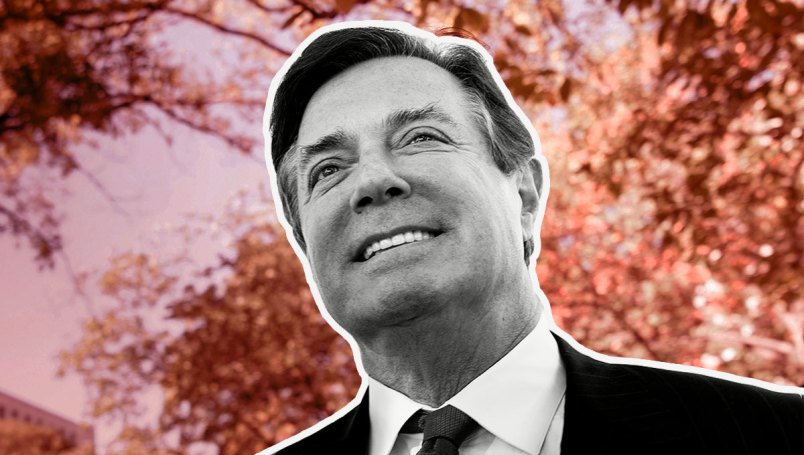Last week’s release of the court transcript of a pre-sentencing hearing offered a rare view inside special counsel Robert Mueller’s Russia investigation.
But like jazz, what the document doesn’t say is arguably more important than what’s spelled out.
The transcript shows that Mueller’s team was deeply concerned that Manafort – after he had pleaded guilty and agreed to cooperate with them – continued to lie in hopes of receiving a pardon from President Trump.
As special counsel prosecutor Andrew Weissmann explained to U.S. District Judge Amy Berman Jackson regarding why the government decided that Manafort has breached his plea agreement, “there was an unusual factor.”
“The second unusual factor, which was REDACTED the normal motives and incentives that are built into a cooperation agreement.”
It’s not immediately clear from the redaction what effect the “unusual factor” had on the “normal motives and incentives” that come as part of agreeing to cooperate with federal prosecutors in a criminal case. But as the hearing progressed, Weissmann spoke further about the issue of Manafort allegedly lying to prosecutors, and how the incentive structure to encourage cooperation and discourage dishonesty seemed askew in Manafort’s case.
“It told us that those incentives were not working — were not working adequately,” Weissmann said. “So, all of that factored into why we were making this decision.”
Ultimately, it led Mueller’s team to declare that Manafort was in breach of his plea agreement and to call off the deal they’d struck with him.
What could have neutralized the normal incentives in a cooperation agreement? What may have motivated Manafort to allegedly lie to prosecutors, after already confessing to a host of crimes, supposedly in exchange for leniency?
Weissmann elaborated further later on in the hearing.
“And the motive, I think, is plain …” Weissmann said. “We can see what it is that he would be worried about, which is that the reaction to the idea that REDACTED would have.”
The prosecutor added: “I think, negative consequences in terms of the other motive that Mr. Manafort could have, which is to at least augment his chances for a pardon.”
Prosecutors first accused Manafort of breaching his plea agreement on Nov. 26, 2018, a little more than two months after he signed his plea agreement on Sept. 13, 2018.
Two days later, the New York Post published an interview with President Trump in which the journalists asked if he was considering a pardon for Manafort.
“Why would I take it off the table?” Trump reportedly replied. “You know this flipping stuff is terrible. You flip and you lie and you get — the prosecutors will tell you 99 percent of the time they can get people to flip. It’s rare that they can’t.”
One of the lies that prosecutors accuse Manafort of telling while he was supposedly cooperating involves his contacts with the Trump administration.
Special counsel prosecutor Greg Andres accused Manafort of lying at an Oct. 16 interview with the Mueller team. Andres told the judge that the specific lie was “that Mr. Manafort denies having direct or indirect communications with the administration, and it’s the indirect part of that that we believe is a false statement.”
Berman Jackson seemed initially skeptical at the hearing, asking Andres “why is this of moment that I should be concerned about it?”
Andres replied that “throughout the interviews with Mr. Manafort and some of the issues we’ve discussed today, you see that he constantly either minimizes the information he has about the administration or any contact with the administration.”
“So there’s an issue whether or not during his cooperation he’s communicating with REDACTED or providing information about the questions or other things that are happening in the special counsel investigation, whether he’s sharing that with other people,” Andres added.
After Manafort’s alleged breach came to light, the New York Times reported that Manafort had secretly been sharing information about the Mueller investigation with Trump’s legal team, through his attorney. The New York Times report did not appear to come up directly in court.
In fact, prosecutors repeated multiple times that they believed defense counsel had acted in good faith, and “operated completely in trying to make sure that this would work.”
It remains unclear whether Manafort’s contacts with the administration – and his alleged dissembling about them – relate directly to the discussion of inverted incentives and his attempt to “augment his chances for a pardon.”







Hope reigns eternal when you continue to hide enough secrets.
Mueller doesn’t do things by accident. So when he throws around a loaded term like “pardon”, you betcha! that he’s sitting on something more substantial than just the President’s public comments.
Maybe that and the very evident fact that Manafort is a soulless jerk, with no conscience.
Wonder if it is beginning to filter into that peabrain rattling around inside that dead raccoon on top of Individual-1’s skull that a pardon for Paulie and others could ultimately result in a conviction for himself?
'Cause even if he still believes “collusion isn’t a crime”, even he cannot argue that witness tampering isn’t either.
Paulie’s got a long, long stint ahead of him.
Manafort, a veteran at “clandestine channels of communication,” no doubt had multiple ways to keep in touch with Stone, Bannon, and the administration proper. Someone like him doesn’t accumulate jail time without making sure he has a Get Out of Jail Free card.